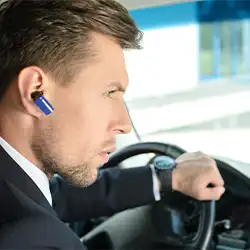Each state has its laws regarding using headphones or earbuds while driving. To ensure compliance and avoid car accidents, you must be aware of the driving laws in the state where you frequently drive.
With years of experience as a personal injury lawyer, I have worked on several cases involving people cited for violations of headphone legislation.
In this article, I will tell you whether or not it is illegal to wear headphones while driving in your state.
Quick Summary
- Wearing headphones while driving can be illegal in some jurisdictions because it can lead to distracted driving.
- If it is legal to use headphones while driving in a particular jurisdiction, any accident that occurs while wearing headphones may result in a charge of negligent driving.
- Many states have a "one-ear policy" that regulates how drivers can use headphones while on the road, permitting the use of a single earbud or Bluetooth wireless headphones in one ear.
Where Can You Drive With Headphones?
You can drive with headphones in certain states.
For example, if you are using wireless headphones, they should be set at low volume or with one earbud removed.
Although certain states have distracted driving laws prohibiting driving with headphones, the regulations vary.
As a matter of fact, in 35 states, it is still perfectly legal to wear headphones while driving.
Currently, it is legal to wear headphones while driving in the following states [1]:
- Alabama
- Arkansas
- Connecticut
- Iowa
- Kansas
- North Dakota
- South Dakota
Currently, in Arizona, it is legal to use headphones while driving.
Still, childcare providers and school bus drivers are not allowed to operate a motor vehicle with headphones to avoid being charged with dangerous driving.
Exception Cases
Although there are regulations in some states regarding the use of headphones while driving, there are exceptions.
These regulations generally permit using a single-ear Bluetooth headset, which enables you to speak to someone on the phone.
Furthermore, most states are reluctant to prohibit hearing aids or cochlear implants.
Several states also have regulations that prohibit using earpieces or headphones for listening to music, even if it is not explicitly prohibited.
Additionally, other states, such as Montana and New Mexico, have different limitations depending on your town.
Where Can't You Drive With Headphones?

These states include:
- Alaska
- California
- Illinois
- Louisiana
- Minnesota
- Maryland
- Rhode Island
- Washington
- Virginia
Listening devices like Bluetooth and other hands-free options are permitted if they only cover one ear to prevent blocking emergency vehicle sounds or other important situations.
Police officers may stop you in these states if they observe that you have violated any traffic laws.
Why Is Driving With Headphones Dangerous?
Driving with headphones is dangerous because it reduces your ability to hear the outside world, which can lead to distracted or dangerous driving.

Using earbuds and Bluetooth devices while driving can be dangerous as they can block out important sounds and distract drivers, increasing the risk of accidents.
Being able to hear is crucial, especially when noticing emergency vehicles that are speeding.
It is recommended that other motorists, bicyclists, and pedestrians avoid using earbuds or headphones that block out environmental sounds while traveling to avoid being charged with distracted driving.
"Wearing earbuds or headphones while driving could intensify your sensory deprivation and cognitive distraction level, potentially creating additional dangers on our roadways."- Cindy Antrican, Public Affairs Manager for AAA
What Happens If You Were To Get In A Car Accident While Wearing Headphones?
If you were to get in a car accident while wearing headphones, you could be liable for negligence. Depending on your state, this could lead to hefty fines or worse.
If the other driver wore headphones while driving the motor vehicle during the car accident, it may be important for your recovery process.
Therefore, it is recommended that you take note of this detail at the accident scene and inform your experienced personal injury lawyer right away.
Penalties For Driving While Using Headphones
Penalties for driving while using headphones can vary depending on the state. 
Meanwhile, other states allow one earbud or headphone in only one ear.
In extreme cases, you could also face loss of license or jail time. For example, in New York, driving with any electronic device without an earpiece attached is illegal.
If caught, you will be fined up to $150 and up to 15 days in jail [2].
Related Article:
If you have been affected by any of these matters, feel free to contact a personal defense attorney who can help.
FAQs
1. Can I Wear Airpods While Driving?
No, you can not wear AirPods while driving. Wearing earbuds while driving a vehicle is generally illegal. However, there could be some instances where wearing one earbud might be allowed, but this varies depending on your location.
2. Can I Wear Headphones While Riding A Motorcycle?
No, you can not wear headphones while riding a motorcycle. It's not a good idea to wear headphones when riding a bike because it can distract you and block out important sounds like sirens and other vehicles.
3. Is It Dangerous To Drive With Headphones?
Yes, it is dangerous to drive with headphones. Wearing headphones while operating a motor vehicle can distract you from hearing important sounds on the road, such as emergency sirens or honking from other drivers.
Contact An Attorney Today
The legality of wearing headphones while driving varies by jurisdiction, but it is generally not recommended due to the potential risks and distractions it can cause.
If you have been involved in a car accident and need legal assistance, the law firm of Schmidt & Clark, LLP can help.
With their expertise and experience in personal injury cases, they can provide the guidance and support you need to navigate the legal process and seek the compensation you deserve.
References:1.https://www.ncbi.nlm.nih.gov/pmc/articles/PMC4001667/2.https://dmv.ny.gov/tickets/cell-phone-use-texting

 Published by
Published by